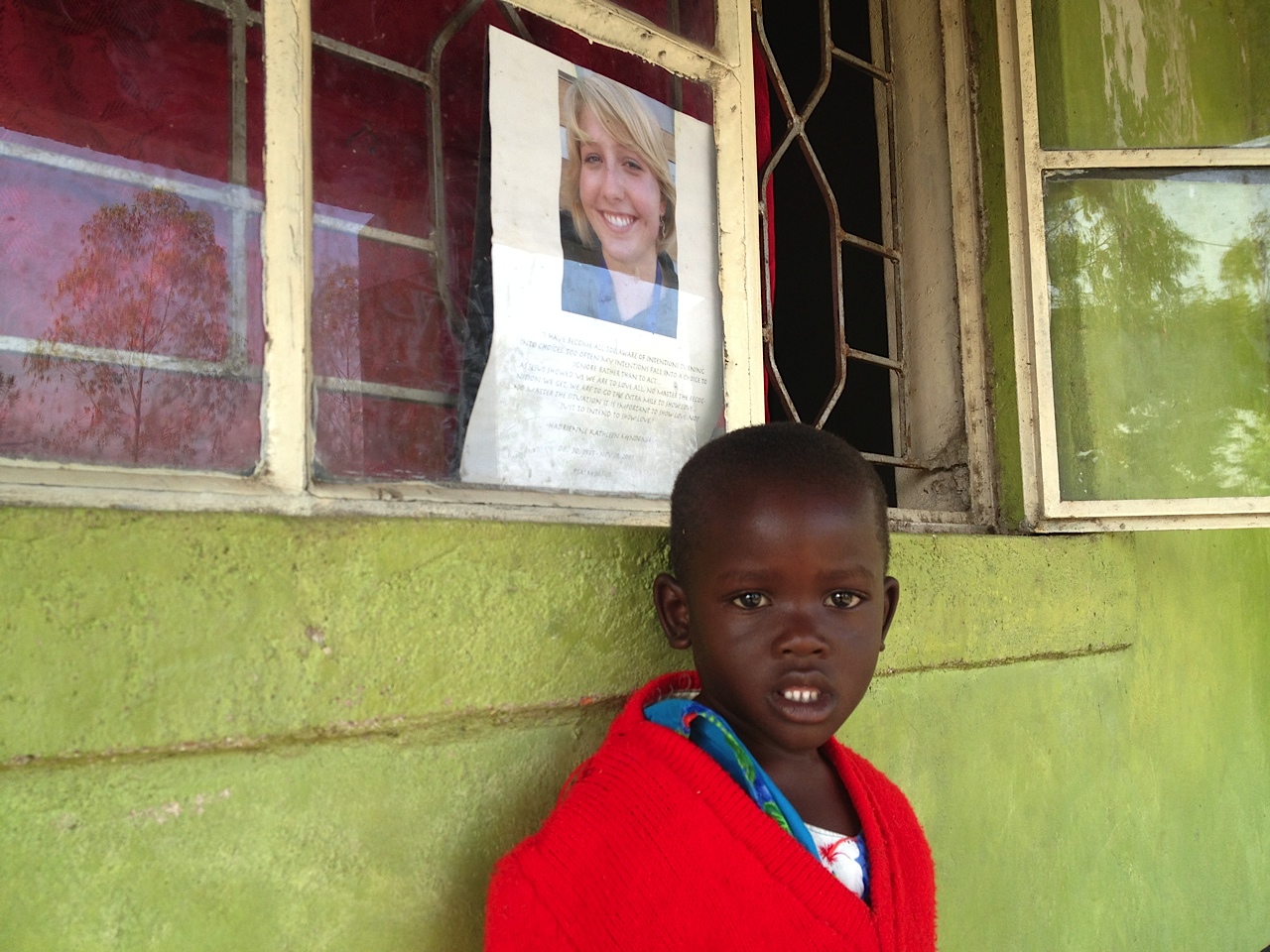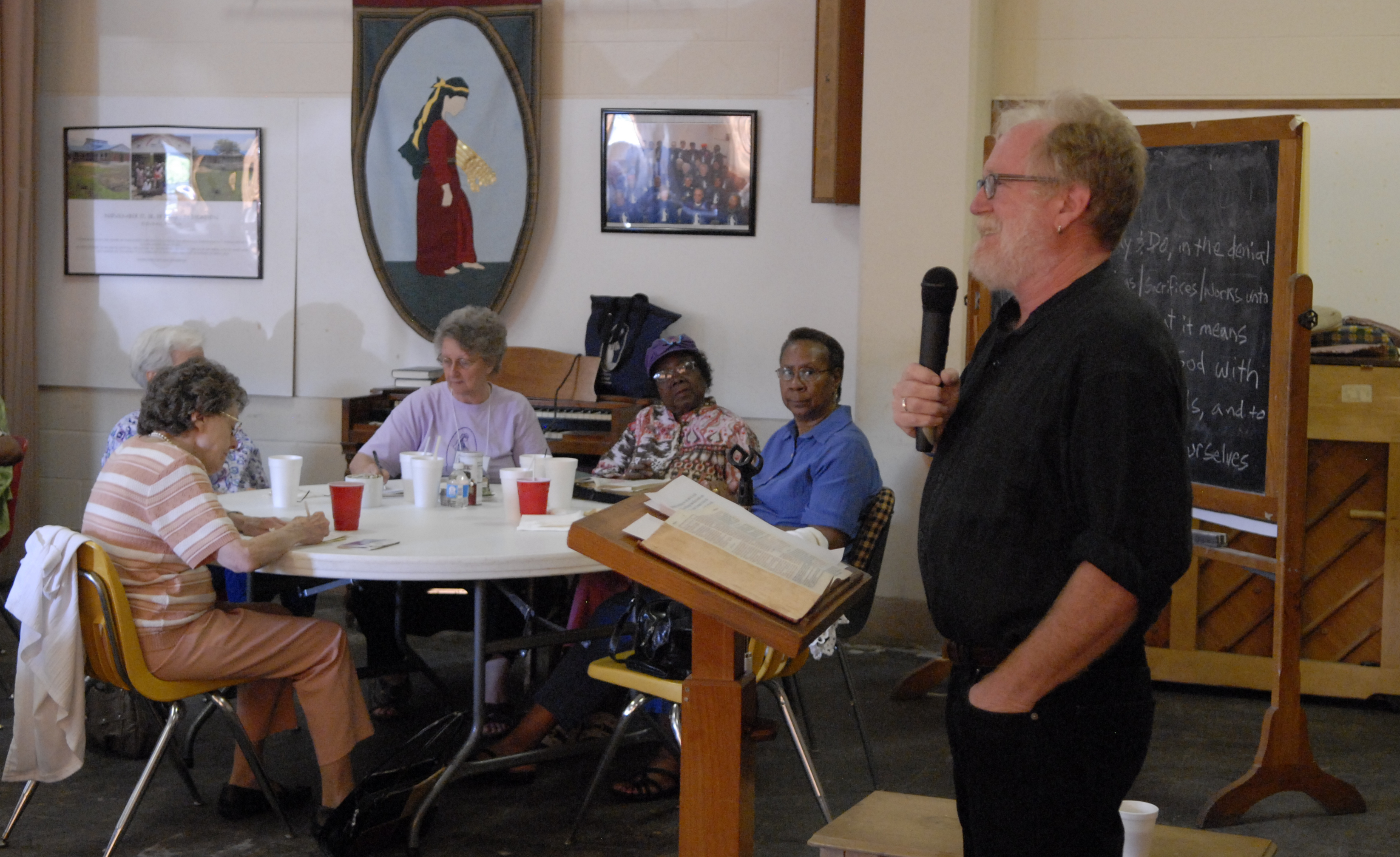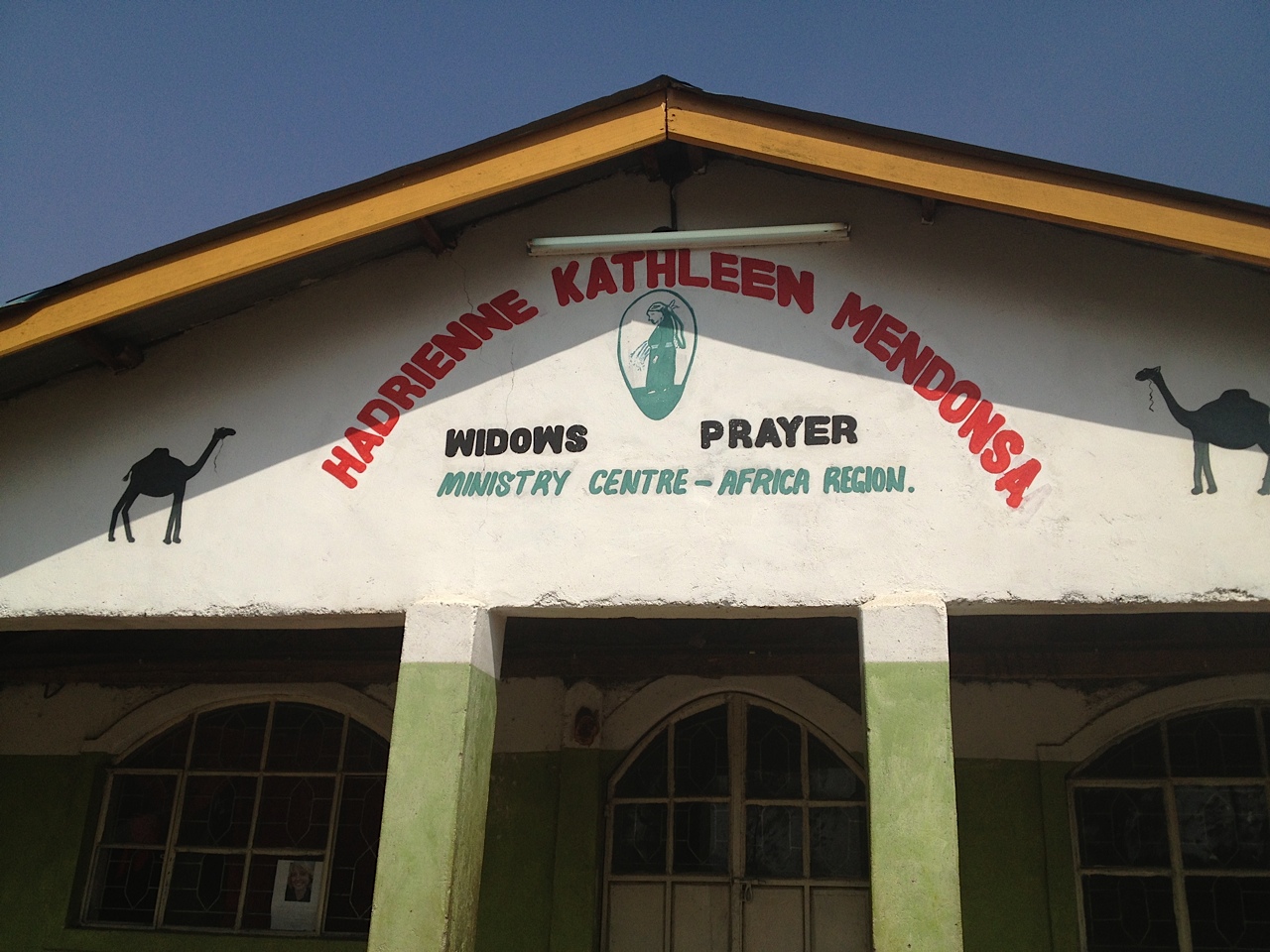An inspirational odyssey: From Chattanooga to East Africa, with faith and love
Sunday, October 27, 2013
It's a two-hour drive from the airport in Nairobi, Kenya, to the school for orphans in Miwani. The trip takes you past parent-less street kids who gaze from haunted eyes crisscrossed by spidery, bloodshot veins. In their hands are crinkled paper bags they clutch tightly, trapping the chemical fumes inside that they "huff" into their lungs, numbing the pangs of their hungry bellies.
As you drive, the heat of the day becomes a reminder that you that you are, in fact, in Africa.
As you get closer to the Ugandan border, you pass hand-molded mud huts, soggy rice paddies and endless rows of sugar cane until finally you see a stand of willowy trees lining the path to the tropically colored building with the carefully written banner - the Hadrienne Kathleen Mendonsa Widow's Harvest Center.
Look closer at the windows and inside a corner pane is tucked a photo of a young, golden-haired woman with an unforced smile. Her words are written below the photo: "We are to love no matter the recognition we get. We are to go the extra mile to show love."
Even as the words seem fitting in this village of too many orphans with too little love, finding the girl's photo in the window is a jolt. Knowing the words found their way from Chattanooga to a windowpane in eastern Africa is a testament to the faith-defying and faith-inspiring odyssey that began with Hadrienne Kathleen Mendonsa's birth in Chattanooga in 1985.
HUMBLE BEGINNINGS
Hadrienne was a baby when her father, Andy Mendonsa, began a study of what he calls "widow's theology." It was, in part, her birth that caused Andy to identify with the vulnerable women in Chattanooga. When Hadrienne was born, the Mendonsas had no medical insurance.
"At the time, Erlanger actually had an indigent maternity ward for non insured patients," Andy explains. "This experience really opened my eyes for what so many poor people know - nothing else but this way of life."
His empathy for the poor led to his work for Inner City Ministries, where he saw firsthand the needs of local widows.
"I had been working for Inner City Ministries for almost a year when the home repair needs of widows began to get my attention," Andy says. "I began to ask God two questions: 'Is there a need for a widow's ministry, and should I be the one to start the ministry?'"
After uttering that prayer, Andy came across the Bible verse that he says had the answers.
"I read James 1:27: 'Pure religion and undefiled before God and the Father is this, to visit the fatherless and widows in their affliction and to keep himself unspotted from the world.' I instantly knew that God had answered my question."
It was a disparate group that met in 1987 for Chattanooga's first Widow's Harvest lunch at the home of the group's co-founding widow, Gertrude Gaston.
"Mrs. Gaston was from an old, affluent, white Chattanooga family, as were most, if not all, of the other widows she had invited," Andy recalls. "The widows I brought could have easily been maids for the other widows that were there."
That lunch led to weekly meetings in which the widows prayed for the needs of all widows around the world. Though the widows trusted their prayers to reach the heavens, they also landed here on Earth, traveling from the Southeast to East Africa to blossom in an especially needy corner of the world in Kenya.
Women have few rights to property in many parts of Africa. Tradition dictates that, when the husband dies, so does the wife's right to claim any land or home. In-laws will force the widow and her children off the land and back to her blood family, but even that family might reject her and her children, leaving her with almost no option for survival. It's called land grabbing.
The Truth, Justice and Reconciliation Commission of Kenya was established by the United Nations in 2008 to investigate, among other crimes, land grabbing. Ronald Slye, a professor at Seattle University of Law, was asked to serve on the commission.
"We had hearings specifically for women and that was a very common theme," says Slye. "Many women were very frustrated because, partially there is sexism in the family, and then the male would not have even spoken to them about the land."
Some women left Kenya, landing in displacement camps across the border in Uganda.
"We actually went to a refugee camp in Uganda where there were mostly refugees, mostly women, who had fled the border area in 2007," Slye recalls.
But for others left behind in Kenya's border region, there was another source of refuge - Widow's Harvest.
LAND OF WIDOWS AND ORPHANS
The founder of Widow's Harvest Kenya, Joshua Atieno, was an orphan who, as a boy, had been taken in by local widows. Atieno became a minister, then left Kenya to study at Philadelphia's Eastern University in the early 2000s. He left behind a wife, Abigael, who was already caring for orphans from villages around Kisumu, a city that sits on Lake Victoria near the Ugandan border.
On a recent Sunday morning, Abigael sits in a mud house on the Widow's Harvest complex in Miwani; female voices singing hymns in Swahili echo from the center. Nearby, the men are as exuberant in their form of worship as the women; they are gathered outside, slaughtering a cow for the widows' and orphans' Sunday lunch.
Inside Abigael's dark hut, a chicken clucks and walks across the living room "furniture"- empty wooden frames with springs that once held cushions when the furniture was properly used in wealthier Kenyan homes. Abigael sits on one frame and a frail widow, Sister Mary, the widow who cared for Joshua after his mother died, sits on another.
"When I was growing up," Abigael recalls, "I had a sort of a vision and I could see in my vision there were children, very many children. I forgot about it when I went to high school, then I met Joshua. The first thing Joshua told me, 'Do you think you can take care of me and be a mother and a wife to me?'"
Abigael remembered her childhood vision and said "yes."
While studying in the U.S., Joshua found the Widow's Harvest website and reached out to Andy Mendonsa, telling him about Kisumu and the widows and orphans left behind. Soon the seeds of Widow's Harvest Kenya were planted.
Though Kisumu was already the land of orphans and widows, political violence had yet to hit the region. But before Kisumu was struck by political turmoil, Andy Mendonsa was struck by personal tragedy.
A TRAGIC TIMELINE
For a long time, Andy dreaded the sound of a ringing phone.
"Every time the phone rang, it was awful," he admits, "For a long time I was pretty afraid."
The first phone call came in 1999 from a chaplain in Colorado who told Andy that his father had fallen while hiking in the nearby mountains and died upon arrival at the hospital.
In May 2005, another shattering phone call came. His son Asher, then a 17-year old high school senior with a passion for photography, had fallen four stories while taking photos on the roof of Parkway Towers, the empty building that sits next to the Tennessee Pavilion and Finley Stadium.
"He broke his neck, his back, had a compound fracture of his right femur and had a traumatic brain injury," Andy says. "His heart rate was 30 with when the EMTs arrived."
Ashe was left paralyzed from the chest down.
"You know, the world kind of stopped at that moment, as we knew it," Andy says.
A few months later, while Asher was still in rehabilitation, the phone rang again.
"There had been a hurricane that caused some tornadoes that night before," Andy says. "About 6:30 in the morning, we got the call from my mother that the tree had fallen on our house."
The tree left $150,000 worth of damage to their home.
A month later, another call. Andy's friend and colleague and president of the Widow's Harvest Board had suddenly died with a heart attack. A few days after Andy received the news of the board member's death, he and Hadrienne had a poignant conversation.
"'Dad, am I next?'" Andy recalls his daughter asking. "And, of course, I'm like, 'Hadrienne, no, no.' I gave her a big hug, and said, 'Just statistically, that's crazy. That's impossible.'"
In November, the phone rang again.
The voice on the other line asked Andy if he had a daughter named Kathleen. Though that was her middle name, Andy just knew it was Hadrienne.
She and her friends were going to see a movie on that Friday night when their vehicle was struck by a car. Her friends suffered severe injuries, but Hadrienne sustained a life-threatening damage to her brain. The doctors offered little hope for her recovery.
On Sunday, Nov. 20, 2005, the Mendonsas took Hadrienne off life support. She died the same day.
Still living in a hotel room while in Chattanooga because of the tornado damage to their home, the Mendonsas went through the motions of preparing for funeral services for Hadrienne.
"The day we picked out Hadrienne's tombstone," Andy remembers, "We had to go pick out a washer and dryer for our house."
The week before the accident, Hadrienne had spent time with Widow's Harvest the widows.
"During that week, Hadrienne made homemade soup, herself, for over 30 widows," her father recalls. "Later, I found out that she went around to every widow that was there and gave them a hug. The widows all said they had never seen her like that. That she just radiated with light. It was the next night that she was in an accident."
BETTER NEWS
That was the last of the bad phone calls for the Mendonsas and, one year later, they received some good news: Widow's Harvest Kenya was dedicating a new building to Hadrienne. The dedication service was set for November 2006, exactly one year after Hadrienne's death. The center with Hadrienne's name was dedicated while a letter from Andy was read at the service. The letter included Hadrienne's words on love that had been found in a letter she had written to a teacher at Chattanooga Christian School. They were placed with her photo inside the window, and the widows began to recite Hadrienne's words from memory as a sort of widows' creed.
"We are to love no matter the recognition we get," they recite. "We are to go the extra mile to show love."
A few years after the center opened, Andy received more news. Two children, one a girl only 11 days old, were brought to the Widow's Harvest center in Kenya. The widows named the infant girl Hadrienne Mendonsa.
The now 4-year old Hadrienne Kathleen Mendonsa, like her namesake, has a contagious and unforced smile. And, like her namesake, she radiates light to the widows. When asked her name, she replies with a smile and says in a loud voice, "Hadrienne Kathleen Mendonsa."
Widow's Harvest Chattanooga still holds its weekly meetings and is gathering more local support. The Mission Chattanooga recently launched an "Adopt-A-Widow" initiative in partnership with Widow's Harvest. Father Chris Sorensen of Mission Chattanooga says Andy reminds him not of Job, a biblical figure hit by tragedy, but of another well-known biblical name.
"I think Andy is a John-the-Baptist-type figure in Chattanooga," Sorensen explains, "He has given his whole life for this ministry, not because it is a sexy ministry. You know, if you had a whole church full of widows you would not have enough money to keep the lights on."
Many days, Chattanooga's John the Baptist figure can be found not in camel's hair, eating locusts and honey, but in cargo shorts and sandals with a silver hoop earring in his ear, sipping coffee at The Camp House. He and his wife's schedule now revolves around caring for Asher, but he still makes time to share his passion for widows.
Though many would lose their faith after the trials Andy faced, Andy says his was strengthened.
"I kept seeing God showing his incredible love to us," Andy says of his trials, "If you look at blame and let the anger and bitterness grow up, then you miss God in the midst of horrific circumstances."
WIDOWS AT WESTGATE
Horrific circumstances recently struck at the heart of Widow's Harvest in Kenya. When terrorists struck at the Westgate Mall in Nairobi in September, two of its widows were feared among the victims. Joshua Atiemo wrote to Andy Mendonsa to ask for prayers for the widows -"Risper Akeyo and Yuanit Kamire.
Atiemo finally found Kamire who had been wounded at Westgate. He relayed her story in an email to Andy.
"Her whole body was full of blood and she thought she was shot," Atiemo wrote. "She continued to lie down for several hours until they were rescued."
Kamire was superficially wounded, and she eventually got back to Widow's Harvest for care.
Akeyo remained missing until Mendonsa received a text from Atiemo: He had found her body at the morgue.



